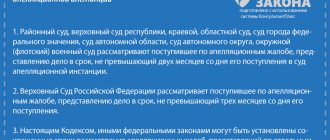Legislation
To bring the servants of Themis to justice, it is necessary to accurately grasp the moment of the violation. The subtleties of each stage of legal proceedings are explained:
- Codes: Civil Procedure Code, CAS, Judicial Ethics;
- Federal Law No. 3132-1 “On the status...”;
- Resolution of the Plenum of the Armed Forces of the Russian Federation No. 13 of April 14, 2021;
- 30-FZ “On the bodies of the judicial community in the Russian Federation”;
- Federal Law “On Justices of the Peace”.
Certain points are mentioned in the judicial practice of the Supreme Court and the Constitutional Court of the Russian Federation. A practicing lawyer can best control the legality of actions performed by a judge.
Reasons
You can complain against a judge for the following actions:
Dear readers! To solve your problem right now, get a free consultation
— contact the lawyer on duty in the online chat on the right or call: +7 (499) 938 6124 — Moscow and region.
+7 (812) 425 6761 — St. Petersburg and region. 8 (800) 350 8362 - Other regions of the Russian Federation You will not need to waste your time and nerves
- an experienced lawyer will solve all your problems!
- delaying the legal process;
- the secretary distorts the facts in favor of one of the participants in the proceedings;
- illegal refusal to accept a request;
- conversation on the phone during the hearing (namely at the time the verdict was announced);
- left the room after he began to announce the decision and did not finish it;
- changes data in the process of keeping minutes of a court session;
- inappropriate behavior (the ethics of judges are defined at the legislative level);
- refusal to include testimony of witnesses and other evidence in the case materials;
- violation of procedural deadlines;
- making unfair and illegal decisions - obvious bias towards one of the parties and ignoring the evidence base;
- refusal to listen to the arguments of a participant in a court session.
It is allowed to protest a violation of the rules of jurisdiction and jurisdiction of the case being examined. The registration address of the plaintiff and/or defendant is important when choosing a court site, as is the essence of the document. Example: the price of a property claim is more than 50,000 rubles, the case must be heard in a district or city court. The amount is less - the magistrate will make a verdict.
The list is incomplete. You can write a statement for other offenses. At each stage of legal proceedings, certain requirements must be met, and violation of them is grounds for a complaint.
When it's no use complaining
The claim will be effective if the legal procedure is violated. Is the plaintiff or defendant unhappy with the decision in a civil or criminal case? There is no point in writing anywhere; they resort to the appellate or cassation procedure to challenge a court decision.
But you definitely need to complain about rudeness and inaction.
Decision of the Disciplinary Board of the Supreme Court of the Russian Federation dated 06/08/2018 N DK18-25
SUPREME COURT OF THE RUSSIAN FEDERATION
In the name of the Russian Federation
SOLUTION
dated June 8, 2021 N DK18-25
The Disciplinary Board of the Supreme Court of the Russian Federation, consisting of
presiding Rudakov S.V.,
members of the board Kirillov V.S. and Voronova A.V.
under secretary Kurdiyashko Y.N.
examined in open court an administrative case on the complaint of Mikhail Vladimirovich Larchenko against the decision of the Qualification Board of Judges of the Kemerovo Region dated March 29, 2018 on the early termination of his powers as a judge of the Central District Court of Kemerovo, Kemerovo Region for committing a disciplinary offense.
Having heard the report of the member of the Disciplinary Board of the Supreme Court of the Russian Federation V.S. Kirillov, the explanations of the administrative plaintiff M.V. Larchenko, the representative of the Qualification Board of Judges of the Kemerovo Region V.I. Zakharova, Disciplinary Board of the Supreme Court of the Russian Federation
installed:
1. Mikhail Vladimirovich Larchenko, <...> year of birth, by Decree of the President of the Russian Federation of June 28, 2010 N 794, was appointed to the position of judge of the Central District Court of Kemerovo, Kemerovo Region, without a term limit.
By the decision of the Qualification Board of Judges of the Kemerovo Region dated March 31, 2021, he was assigned the fifth qualification class.
March 5, 2021 Chairman of the Kemerovo Regional Court Kiryushin A.N. appealed to the qualification board of judges of the Kemerovo region (hereinafter also referred to as the KKS of the Kemerovo region) with a proposal to attract judge M.V. Larchenko. to disciplinary liability for committing a disciplinary offense, which led to a violation of the rights of participants in the process and derogation of the authority of the judiciary.
It follows from the submission that by order of the Chairman of the Kemerovo Regional Court dated September 21, 2021 N 257 l/s (as amended by the order dated October 3, 2021 N 268 l/s) commissions were created consisting of three judges of the Kemerovo Regional Court to check compliance with procedural and other deadlines when considering civil cases, including deadlines for drawing up reasoned decisions and submitting cases to the office management department, quality and stability of judicial acts adopted for the period from January 1, 2016 to September 21, 2021 by a number of judges of district courts of the Kemerovo region , in particular by the judge of the Central District Court of Kemerovo Larchenko M.V.
The submission indicated that the audit revealed dishonest and improper execution by Judge M.V. Larchenko. their professional duties, which was reflected in a gross and systematic violation of civil procedural legislation, instructions on judicial records management in the district court, namely: violation of the deadlines for preparing reasoned decisions and sending them to persons participating in the case; violation of deadlines for submitting cases to the records management department and sending cases to the appellate authority; improper control over the conduct of office work, which resulted in a violation of the rights of participants in the process; untimely receipt of funds to the budget; diminishing the authority of the judiciary. In support of these violations, the submission contains references to specific civil cases, during the consideration of which, in the opinion of the chairman of the Kemerovo Regional Court, judge M.V. Larchenko. There were gross and systematic violations of civil procedural legislation and instructions for judicial proceedings in the district court.
By the decision of the qualification board of judges of the Kemerovo region dated March 29, 2021, the proposal of the chairman of the Kemerovo regional court was satisfied. Judge of the Central District Court of Kemerovo, Kemerovo Region Larchenko M.V. for committing a disciplinary offense, he was brought to disciplinary liability in the form of early termination of the powers of a judge with deprivation of the fifth qualification class.
The Qualification Board of Judges of the Kemerovo Region came to the conclusion that the facts set out in the submission were confirmed; they indicate that judge M.V. disciplinary offense. The Qualification Board of Judges indicated that the totality of the violations identified indicates the dishonest attitude of Judge M.V. Larchenko. to the performance of their official duties in the administration of justice, which led to violations of procedural law when the judge considered these civil cases, to gross violations of the rights of participants in the process, which is unacceptable in the administration of justice. The KKS of the Kemerovo region noted that judge Larchenko M.V. had knowledge of the laws and other regulations of the Russian Federation, and also had sufficient length of service and work experience to successfully carry out his professional duties. Admitted by judge Larchenko M.V. violations of the law are systemic in nature, are gross, discredit the title of judge, contribute to the formation in civil society of a negative attitude towards the activities of courts in general, and also detract from the authority of the judiciary and are incompatible with the status of a judge. The qualification board considered that the crime committed by judge Larchenko M.V. A disciplinary sanction in the form of early termination of a judge’s powers is commensurate with a disciplinary act.
Having disagreed with the decision of the Kemerovo Region CCC on the early termination of the judge’s powers, Larchenko M.V. appealed to the Disciplinary Board of the Supreme Court of the Russian Federation with a complaint in which he asks to cancel this decision, citing the disproportion of the disciplinary sanction applied to him in the form of early termination of the powers of a judge to the violations identified during the inspection.
Without denying the facts of violations set out in the presentation of the Chairman of the Kemerovo Regional Court and the decision of the Kemerovo Regional Court of Justice, Larchenko M.V. indicated that violations of the deadlines for preparing reasoned decisions and deadlines for submitting cases to the department for ensuring legal proceedings in civil cases did occur, but mainly in the first quarter of 2021, April, May 2016, and the violation of deadlines in a number of cases was insignificant, amounted to a few days. Thus, from 1 to 7 days for the entire 2021, the deadlines for drawing up reasoned decisions and submitting cases out of 279 in 21 cases were violated. At the same time, more than 150 cases were in violation of the deadline for drawing up reasoned decisions within 10 days, 85 cases were in violation of the deadline of up to 10 days. In 2021, 167 cases were submitted with missed deadlines for submitting cases, when reasoned decisions were drawn up on time, of which 12 cases were submitted with a deadline of 1 to 8 days. In 2021, when the deadline for preparing reasoned decisions was violated by several days (from 1 to 10 days), when the cases were submitted on time, the deadline was violated in 60 cases out of 71.
Over the 9 months of 2021, the deadline for submitting cases was violated, when motivated decisions were drawn up on time, out of 94 cases with violations of up to 8 days, 60 cases were submitted. Of these, in 16 cases the deadline was violated by 1 day. Simultaneous violation of the deadlines for preparing reasoned decisions and submitting cases for 9 months of 2021 out of 52 cases amounts to up to 10 days in 42 cases. At the same time, 50 cases were in violation of the deadline for drawing up reasoned decisions within 10 days, 44 cases were in violation of the deadline for submitting cases by up to 10 days. With a violation of the deadline for the production of reasoned decisions for 9 months of 2021, up to 9 days out of 44 cases amounted to 43 cases, of which 10 cases were 1 day each.
According to M.V. Larchenko, the appealed decision of the qualification board of judges contains references to violations committed by the judge in civil cases in the first quarter of 2021, for which on the day of the meeting of the qualification board of judges (March 29, 2021), the statute of limitations for bringing charges had expired judges to disciplinary action, since more than two years have passed since the commission of these violations. In connection with the above, these cases are not subject to consideration when deciding whether to impose a disciplinary sanction. The Qualification Board did not take into account that the situation with violations of deadlines in the audited period of 2021 compared to 2016 has changed for the better, which indicates that they made the appropriate conclusions. In some civil cases, there were cases of untimely submission of enforcement documents, but such cases were isolated, were not systematic, and did not entail a violation of the rights of citizens and legal entities - participants in litigation in these specific cases.
He believes that the systematic violation of the deadlines for preparing reasoned decisions in civil cases and the deadlines for submitting them to the records management department was facilitated by the improper work of the court apparatus, in particular the assistant judge (who was repeatedly absent due to illness), and the frequent change of the secretary of the court session, who did not have the appropriate training.
As M.V. Larchenko believes, the disciplinary offense he committed is not exceptional, and certainly entails the application of extreme disciplinary measures; the decision of the Kemerovo Region Qualification Court does not provide information about the deliberate nature of the judge’s actions, and does not take into account data characterizing his personality and professional activities .
At the court hearing of the Disciplinary Board of the Supreme Court of the Russian Federation, administrative plaintiff Larchenko M.V. supported the arguments and request set out in the complaint.
Representative of the Qualification Board of Judges of the Kemerovo Region V.I. Zakharov requested that the complaint be dismissed based on the arguments set out in the objections, citing the fact that the decision was made on the basis of specific facts confirming the commission of M.V. Larchenko. disciplinary offense.
2. Articles 118, 120 (part 1), 121, 122 of the Constitution of the Russian Federation and the provisions of Art. Art. 1, 4, 5, 15 and 16 of the Federal Constitutional Law of December 31, 1996 N 1-FKZ “On the Judicial System of the Russian Federation” established a special legal status of a judge, designed to ensure the protection of public interests, primarily the interests of justice, the purpose of which is to protect rights and freedoms of man and citizen.
Law of the Russian Federation of June 26, 1992 N 3132-I “On the status of judges in the Russian Federation” establishes special qualification and other requirements for judges, which include special requirements for the procedure for terminating the powers of a judge, and provides (clause 1 of Art. 12.1) the possibility of imposing on a judge, with the exception of judges of the Constitutional Court of the Russian Federation, by decision of the relevant qualification board of judges, a disciplinary sanction, including in the form of early termination of the powers of a judge, for committing a disciplinary offense (violation of the norms of this law, as well as the provisions of the code of judicial ethics , approved by the All-Russian Congress of Judges).
The basic requirements for a judge, failure to comply with which may lead to early termination of his powers, are formulated in Art. 3 of the said law, according to which the judge is obliged to strictly comply with the Constitution of the Russian Federation and other laws (clause 1); when exercising his powers, as well as in extra-official relations, he must avoid anything that could diminish the authority of the judiciary, the dignity of a judge or raise doubts about his objectivity, fairness and impartiality (clause 2).
Gross and systematic failure by a judge to comply with procedural rules of law entails a distortion of the principles of legal proceedings, a violation of the rights of participants in the process, detracts from the authority of the judiciary, and damages the reputation of the judge.
The Code of Judicial Ethics stipulates that a judge, when performing his duties in the administration of justice, must proceed from the fact that judicial protection of the rights and freedoms of man and citizen determines the meaning and content of the activities of the judiciary; in his professional activities, a judge is obliged to comply with the Constitution of the Russian Federation, federal constitutional laws, federal laws, be guided by the Law of the Russian Federation “On the Status of Judges in the Russian Federation”, norms of procedural legislation, other regulatory legal acts, as well as the principles and rules of conduct established by the code of judicial ethics, generally accepted norms of morality and ethics, strictly follow the judge’s oath.
Based on the constitutional and legal status of judges implementing the public legal goals of justice, and the provisions of paragraph 1 of Art. 6 of the Convention for the Protection of Human Rights and Fundamental Freedoms, which is by virtue of Part 4 of Art. 15 an integral part of the legal system of the Russian Federation, subparagraph “c” of paragraph 3 of Art. 14 of the International Covenant on Civil and Political Rights, a judge must consider criminal, civil and administrative cases without undue delay, in strict accordance with the rules of legal proceedings.
Article 12 of the Code of Judicial Ethics establishes the rules of conduct for a judge when exercising organizational and administrative powers.
So, in accordance with paragraph 1 of Art. 12 of the Code of Judicial Ethics, the professional activity of a judge includes not only the performance of duties related to trial of a case and decision-making, but also the performance of other tasks and powers, including those of an organizational and administrative nature, related to the activities of the court.
Since the administration of justice is impossible without a clear organization of the work of the court apparatus, improper organization of the court and its apparatus undermines confidence in the court and detracts from the authority of the judiciary (clause 4).
3. Having discussed the arguments of M.V. Larchenko’s complaint, as well as objections to it, having examined and assessed the evidence presented, the Disciplinary Board of the Supreme Court of the Russian Federation does not see any grounds for canceling the decision of the Qualification Board of Judges of the Kemerovo Region dated March 29, 2021.
The Qualification Board of Judges of the Kemerovo Region reasonably recognized that Judge Larchenko M.V. there were violations of the requirements of civil procedural legislation and instructions for judicial record keeping in a district court, approved by order of the Judicial Department at the Supreme Court of the Russian Federation dated April 29, 2003 N 36 (hereinafter referred to as the Instructions), which are systematic in nature and indicate the presence of significant deficiencies in the work Judge M.V. Larchenko, about the lack of proper control over the work of the apparatus, which is expressed in an improper and dishonest attitude towards the performance of their professional duties.
By virtue of Part 1 of Art. 199 of the Code of Civil Procedure of the Russian Federation (as amended by Federal Law No. 220-FZ of June 23, 2021), the court decision is made immediately after the hearing of the case. The court must announce the operative part of the decision at the same court session in which the trial of the case ended. The announced operative part of the court decision must be signed by all judges and attached to the case. When executing the operative part of the decision in the form of an electronic document, an additional copy of this operative part of the decision is made on paper, which is also attached to the case.
Drawing up a reasoned court decision may be postponed for a period of no more than five days from the date of completion of the trial of the case (Part 2 of Article 199 of the Code of Civil Procedure of the Russian Federation).
Paragraph 14 of the Resolution of the Plenum of the Supreme Court of the Russian Federation dated December 19, 2003 No. 23 “On the Judgment” drew the attention of the courts to the need for strict compliance with the established Art. 199 of the Code of Civil Procedure of the Russian Federation, the deadline for drawing up a reasoned decision.
From the preamble of the Instruction it is clear that it defines and establishes a unified system of organization and procedure for conducting judicial proceedings in district courts of the Russian Federation, providing for recording and maintaining the document flow of the district court, uniform requirements for the execution of procedural and other documents, ensuring the optimal procedure for the transfer and movement of procedural and other documents. documents in the structures of the district court, the procedure for the current storage of court cases, documentation and their transfer to the archive.
In accordance with the second paragraph of clause 7.9 of the Instructions, after completing all steps to formalize the case, but no later than ten days after its consideration and the decision in final form, the secretary of the court session transfers the case to the records management department.
Thus, the timely preparation of a reasoned decision and providing persons participating in the case with the opportunity to familiarize themselves with it are the responsibility of the court, a guarantee of the implementation of the right to appeal court decisions, and the timely delivery of cases to the records management department is a guarantee of the timely referral of the case to the appellate court and execution court decision.
From the materials presented to the court, it is clear that the basis for the proposal by the chairman of the Kemerovo Regional Court to bring judge M.V. Larchenko to disciplinary liability. The results of the inspection, during which numerous facts admitted by Judge M.V. Larchenko were revealed, were submitted for consideration by the KKS of the Kemerovo region. violations of deadlines for preparing reasoned decisions, sending them to persons participating in the case, violation of deadlines for submitting cases to the records management department and sending cases to the appellate instance, improper control over the conduct of records management.
The Qualification Board of Judges recognized that the deadlines for preparing reasoned court decisions and at the same time the deadlines for submitting cases to the department for ensuring legal proceedings in civil cases for the period 2021 were violated in 279 cases considered by Judge M.V. Larchenko. At the same time, the deadline for drawing up reasoned decisions was violated by up to 54 days (case No. 2-3008/2016: considered on March 18, 2016, a reasoned decision was drawn up on May 16, 2021), and the deadline for submitting cases exceeded one month in 97 cases.
In addition to these cases, in 71 cases considered in 2021 by Judge M.V. Larchenko, the deadline for drawing up reasoned decisions was violated by up to 45 days (case No. 2-1490/2016: considered on March 29, 2016, a reasoned decision drawn up on May 19, 2021 G.). The audit also established that, in addition to the above cases, in 167 cases considered by Judge M.V. Larchenko. in 2021, the deadlines for submitting cases to the department for ensuring legal proceedings in civil cases up to 120 days were violated (case No. 2-645/2016: considered on February 4, 2021, submitted to the office management department on June 18, 2021).
The KKS of the Kemerovo region established that out of 675 cases considered by judge Larchenko M.V. in 2021, in 350 cases the deadlines for drawing up reasoned decisions were violated and in 446 cases the deadlines for submitting cases to the department for ensuring legal proceedings were violated.
The KKS of the Kemerovo region established similar violations by judge M.V. Larchenko. and in 2021
Thus, based on the results of the audit, it was established that in 52 cases considered by judge Larchenko M.V. For 9 months of 2021, both the deadlines for drawing up reasoned decisions (up to 14 days) and the deadlines for submitting cases to the department for ensuring legal proceedings in civil cases (up to 30 days) were violated. Additionally, in 44 cases the deadlines for drawing up reasoned decisions were violated (up to 12 days), and 94 civil cases were submitted in violation of the deadline to the department for ensuring legal proceedings in civil cases (up to 41 days).
Of the 253 civil cases considered by Judge Larchenko M.V. for 9 months of 2021, the deadline for preparing reasoned decisions was violated in 96 cases, and the deadline for submitting cases to the department for ensuring legal proceedings was violated in 146 cases.
At the same time, the Disciplinary Board agrees with the arguments of the administrative plaintiff Larchenko M.V. and considers it necessary to exclude from the decision of the KCC of the Kemerovo region cases both with violation of the deadlines for drawing up reasoned decisions, and the deadlines for submitting cases to the department for ensuring legal proceedings (a total of 81 cases for the period of 2016), for which expired at the time of the decision of the KCC of the Kemerovo region (29 March 2021) statute of limitations (two years from the date of the commission) for bringing to disciplinary liability specified in paragraph 6 of Art. 12.1 of the Law of the Russian Federation of June 26, 1992 N 3132-I “On the status of judges in the Russian Federation”.
In the remaining cases, which were the basis for the decision on the early termination of the powers of Judge M.V. Larchenko, the statute of limitations for bringing to disciplinary liability has not expired.
According to the Disciplinary Board, the exclusion of the specified number of cases from the decision of the Kemerovo Region CCC does not in itself indicate the absence of judge M.V. Larchenko in his actions. disciplinary offense, since the violations committed by him are massive and systematic.
During the inspection, numerous facts were established (in 228 cases handled by Judge M.V. Larchenko) of violations of the requirements of Art. 214 Code of Civil Procedure of the Russian Federation (sending copies of the court decision), Art. 236 Code of Civil Procedure of the Russian Federation (sending copies of a court decision in absentia), Art. 227 of the Code of Civil Procedure of the Russian Federation (sending copies of the court ruling to persons participating in the case), expressed in the direction of copies of court decisions with a significant violation of the deadlines established by the above norms of procedural legislation, which creates an obstacle to the implementation of the rights of citizens and legal entities to timely appeal court decisions, and also for their timely execution. Thus, in case No. 2-150/2016, the court decision was adopted in final form on February 5, 2021, a copy of the decision was sent to the party who was not present at the court hearing on April 8, 2021, the deadline was violated by 58 days.
The audit also established that violations of the deadlines for submitting cases to the department for ensuring legal proceedings in civil cases led to the untimely sending of enforcement documents both for the collection of funds to the budget and to collectors. In case No. 2-156/2016 on the recovery of wages, the decision came into force on March 3, 2021, was submitted to the civil proceedings department on June 3, 2021 (three months later), a writ of execution was issued on June 7, 2021.
During the inspection, it was found that in violation of the requirements of Art. 229 of the Code of Civil Procedure of the Russian Federation in 40 civil cases the date of compilation of the minutes of the court session is not indicated, in a number of cases in violation of the requirements of Art. 230 of the Code of Civil Procedure of the Russian Federation, the protocols of the court hearings were drawn up, but not signed by the secretary of the court session and judge M.V. Larchenko. These circumstances indicate the self-removal of Judge M.V. Larchenko. from the proper performance of their official duties.
In cases considered by judge M.V. Larchenko, there were violations of the established deadlines for sending appeals to the parties and cases to the appellate instance, which is also reflected in the inspection materials and was confirmed both when considering the proposal to attract M.V. Larchenko. to disciplinary liability, and at a meeting of the Disciplinary Board.
Excessive and lengthy drafting by judge M.V. Larchenko court decisions and the submission of cases to the records management department led to numerous complaints from participants in court proceedings about red tape, while out of 18 complaints and appeals from citizens and organizations (during the period under review), 4 were recognized as justified and related to the untimely preparation of reasoned decisions and untimely delivery of cases to the department ensuring legal proceedings in civil cases.
We cannot agree with the position of Judge M.V. Larchenko. that the current situation with civil cases is due to the lack of proper organization of the work of his apparatus and insufficient funding for the judicial system for postal expenses.
The Kemerovo Region CCC came to the correct conclusion that the judge is responsible for performing the necessary procedural actions at all stages of civil proceedings. His responsibilities include, among other things, organizing the work of the court secretary and assistant judge, improving their professional level, and constantly monitoring their work.
The Chairman of the Central District Court of Kemerovo repeatedly drew the attention of Judge M.V. Larchenko. to comply with the requirements of procedural legislation and the Instructions, as evidenced by the minutes of operational meetings of judges of the Central District Court of Kemerovo. However, judge M.V. Larchenko did not draw proper conclusions for himself. did not, as evidenced by the materials of the disciplinary proceedings.
The workload of Judge M.V. Larchenko given in the statistical data. during the period under review was not significant and did not differ in particular complexity compared to other judges of the Central District Court of Kemerovo, considering civil cases. At the same time, indicators characterizing the quality of a judge’s work (the number of judicial acts canceled or amended by higher courts) during the period under review were below the regional average.
At the court hearing of the Disciplinary Board of the Supreme Court of the Russian Federation, judge M.V. violations, as well as the circumstances on the basis of which the KKS of the Kemerovo region came to the conclusion that the judge had committed a disciplinary offense entailing disciplinary liability in the form of early termination of the judge’s powers, were confirmed.
The KKS of the Kemerovo region rightly recognized that judge Larchenko M.V. a disciplinary offense has been committed. The circumstances indicating this are set out in detail in the decision of the qualification board.
The study of the presented materials at the court hearing of the Disciplinary Board of the Supreme Court of the Russian Federation indicates that the violations of the procedural legislation in civil cases committed by the administrative plaintiff and the instructions for judicial records management in the district court, the lack of control over the work of the staff of the apparatus correspond to those indicated in the decision of the Kemerovo Court of Justice areas.
These circumstances are confirmed by the relevant materials of civil cases, examined during the meeting of the Disciplinary Board of the Supreme Court of the Russian Federation, as well as other evidence available in the materials of disciplinary proceedings, and indicate gross violations of the requirements of the current procedural legislation by the judge, and a lack of control on his part over the work apparatus, as well as non-compliance with the fundamental principles of legal proceedings in the administration of justice. The established facts were systematic and widespread, and their cause was the dishonest attitude of judge M.V. Larchenko. to their official duties and standards of judicial ethics.
Taking into account the above, having checked the arguments of the complaint of Larchenko M.V. and the objections of the representative of the Qualification Board of the Kemerovo Region to it, the Disciplinary Board of the Supreme Court of the Russian Federation considers the conclusion of the Qualification Board of Judges of the Kemerovo Region to be justified that those admitted by Judge Larchenko M.V. violations in the administration of justice are gross, systematic and by their nature incompatible with the high rank of a judge, discredit the honor and dignity of a judge, and detract from the authority of the judiciary. Such actions indicate the disdainful attitude of Judge M.V. Larchenko. to comply with the requirements of the law and the norms of judicial ethics, violate the rights of the participants in the process and do not give grounds to expect that he will conscientiously perform the duties of a judge in the future, therefore one should agree with the conclusion of the Qualification Board of Judges of the Kemerovo Region that he has committed a disciplinary offense.
Taking into account that on the part of judge Larchenko M.V. there was a gross and systematic failure to comply with procedural rules of law and inaction in the matter of organizing the activities of the apparatus, the Disciplinary Board of the Supreme Court of the Russian Federation comes to the conclusion that the actions of Judge M.V. Larchenko entailed a distortion of the principles of civil proceedings, detracted from the authority of the judiciary, had a negative impact on the public assessment of the activities of the court, and interfered with increasing confidence in the judicial system, and therefore there are grounds for canceling the decision of the Qualification Board of Judges of the Kemerovo Region on the grounds of the complaint due to their inconsistency Disciplinary Board of the Supreme Court of the Russian Federation He does not see a federation.
Applied to judge Larchenko M.V. the measure of disciplinary liability in the form of early termination of a judge’s powers is proportionate to the severity of his violations and their consequences.
At the same time, the KKS of the Kemerovo region recognized the arguments of M.V. Larchenko as untenable. about the heavy workload and understaffing of the apparatus, correctly pointing out that these circumstances cannot serve as an excuse for a gross and systematic violation of the requirements of procedural legislation over a long period of time.
The decision to involve judge M.V. Larchenko disciplinary liability in the form of early termination of the powers of a judge was imposed by the Kemerovo Region Qualification Court in its competent composition, by secret ballot. 13 members of the qualification board of judges of the Kemerovo region out of 14 participating in the meeting voted for this decision. No violations of the voting procedure were found.
Based on the above, guided by Articles 177, 234, 238 of the Code of Administrative Procedure of the Russian Federation, the Disciplinary Board of the Supreme Court of the Russian Federation
decided:
refuse to satisfy the complaint of Mikhail Vladimirovich Larchenko against the decision of the Qualification Board of Judges of the Kemerovo Region dated March 29, 2021 on the early termination of his powers as a judge of the Central District Court of Kemerovo, Kemerovo Region for committing a disciplinary offense.
The decision can be appealed to the Appeals Board of the Supreme Court of the Russian Federation within a month from the date of its adoption in final form.
Presiding
S.V.RUDAKOV
Board members
V.S. KIRILLOV
A.V.VORONOV
How to write a complaint against a judge
The private complaint includes the following information:
- Where we write, indicating the name of the chairman and address (upper right corner).
- From whom - provide full name, registration address (actual residence), telephone number.
- The title of the document is “Complaint” (middle).
- The essence (to whom, for what reason, the protest is being filed).
- Norms of violated legislative acts.
- The operative part is the requirements.
- List of attached documents, photos, videos, witness statements, etc.
- Date, signature.
Attention! The choice of punishment is the prerogative of the judiciary. There is no need to say what verdict you want, just list the rights violated during the hearing.
While the application is being considered, it is permissible to apply for a postponement of the consideration of the case or for the recusal of this judge. The use of photos, videos, and audio recordings is not prohibited. There is no need to ask permission to record or explain why this is being done.
It is better to make an application on a computer. Illegible handwriting is grounds for refusal to accept it. If a document is submitted through a representative, his authority is confirmed by a notary.
Remember! When describing the essence of the complaint, they do not mention the illegality of the decision - they are appealed in a different manner. Specifically indicate what the judge did that was illegal, what point of the rules of conduct was violated.
Complaint to the Qualification Board
The Qualification Board is a board that deals with issues directly related to complaints against unscrupulous judges who violate the law.
This board consists of from 11 to 19 members, the structure of which consists of the public and the President, as well as judges such as: supreme courts of the constituent entities of the Russian Federation, arbitration courts, military garrison courts, district courts, magistrate courts.
The main components when writing a complaint to the KKS:
- Name of the body of the judicial society;
- Information about the applicant. If the applicant is an individual, then it is necessary to indicate the following information: the applicant’s full name, address, both place of residence and postal address, contact telephone number or email address. If the applicant is a legal entity, then it is necessary to indicate the following information: full name of the representative, name of the legal entity, location address, postal address, contact telephone number and email address;
- Information about the judge against whom the complaint is being made, namely: full name of the judge, name and address of the court;
- Description of the judge's misconduct.
- The date of filing the complaint is indicated and a handwritten signature is affixed.
For a representative of an organization, it is necessary to attach to the complaint a power of attorney from the organization, on the basis of which he represents its interests and confirms his authority.
Under what circumstances will a complaint to the KCC not be considered:
- The complaint does not contain information about the disciplinary offense of the judge;
- The complaint contains obscene statements, insults or threats;
- The complaint is written in such a way that it is impossible to read;
- The complaint has been sent to that supervisory authority to resolve the issue;
- The complaint was sent anonymously.
Where can you complain about violations of procedural actions?
In order for the complaint to be relevant, it is better to submit it during the judicial proceedings: today a violation occurred, tomorrow they wrote a statement.
Delaying submission deadlines reduces the effectiveness of the expected result. The advice applies if you complain to the chairman. But the application must be submitted to the panel of judges after the completion of the proceedings.
For your information! A protest is most effective when a decision is overturned by a higher authority. This means the verdict is wrong and the judge is wrong!
If you do not have the help of a lawyer, it is better to use a completed sample to draw up the document.
To the chairman of the court
In order not to violate the chain of command, you must first submit an application to the chairman of the court. Without an attempt to resolve the matter through him, higher authorities will reject the complaint. Complaints are made to the chairman of the district court about a magistrate or district judge. Arbitration and regional courts also have their own chairmen.
Important! You cannot complain about an arbitration judge to a regional or city court.
The final authority will be the Chairman of the Supreme Court.
To the prosecutor's office
If criminal liability is provided for the violations committed, the information will be checked by the prosecutor's office. People apply there personally or will be redirected on behalf of the board.
To the Qualification Board of Judges
A complaint to the Qualification Board of Judges will have a positive effect, since they have the right:
- impose disciplinary action;
- suspend, terminate the powers of a servant of Themis who has violated the law.
Important! When contacting the CCJ, demand punishment not only for the negligent judge, but also for the chairman who did not want to restore justice in accordance with the law.
The decision will be legal if at least 2/3 of the members were present at the meeting. The commission's verdict is not disputed and is final. Only the Investigative Committee can initiate a criminal case. To do this, it is better to contact the prosecutor's office immediately.
There are regional KKS. The main body is the High Qualification Board of Judges (HQJC).
To the President
Each judge is appointed to his position by legislative acts signed by the head of state. Accordingly, he has the right to punish them. On the official website fill out the form https://letters.kremlin.ru/letters/send. The claim will be reviewed by employees of the Presidential Administration authorized to work with individuals and legal entities.
Most likely, the information will be forwarded to the official who is competent to resolve the problem. The applicant must be notified of the redirection.
For your information! People turn to the president as the head of state for help on any issue! But, most likely, the letter will be forwarded according to jurisdiction to the required department.
What is a judicial panel?
In the Russian Federation, the term “qualification board of judges” means a public body of the judicial community, which operates in accordance with the Federal Law “On Bodies of the Judicial Community in the Russian Federation.”
In particular, the tasks of this body include:
- Improving the judicial system of the Russian Federation;
- Affirmation of the authority of the judiciary;
- Protection of the rights and interests of participants in the trial;
- Ensuring that judges comply with the requirements imposed by the laws of the Russian Federation and the Code of Judicial Ethics.
How to submit
This can be done in three ways:
- take it personally to the court office;
- transfer via courier service;
- send by mail.
You can contact the prosecutor or the president online on the official website. Sending emails is pointless.
Important! Filing a complaint by mail is carried out by registered mail with acknowledgment of receipt!
When delivering documents in person, prepare a second copy in advance. On it is placed:
- date of acceptance;
- registration number;
- position, name of the person in charge.
Or the secretary will issue a receipt with the above information.
How to file a complaint to the chairman of the court against the actions of a judge
To begin with, let us remind the reader that the chairman of the court and the presiding officer are two different officials of the judicial system. If the presiding judge is the judge who conducts the trial, then the chairman of the court is the head of the district or regional court. Judges of the magistrate's court are independent units; they do not have a chairman in their area. But a complaint against the actions of magistrates can be filed with the chairman of the district court of the district to which the magistrate belongs.
Example . The magistrate of the Leninsky district accepted the case on charges of P.O. Kamenev. in committing a crime under Part 1 of Art. 115 of the Criminal Code of the Russian Federation (causing minor harm to health). The case was postponed several times, and the review process dragged on for many months. Victim P.L. Morozov wrote a complaint addressed to the chairman of the Leninsky District Court about red tape. Having considered the appeal and carried out a check on it, the head of the district judicial level prepared a submission to the regional court in the KKS to bring the magistrate to disciplinary liability.
Most often, the chairman of the district court is approached precisely because of violations of the procedural deadlines for considering cases, when judges are inactive and delay the consideration of disputes. As a manager, he is entrusted with the functions of distributing the workload between district judges and monitoring the work of justices of the peace - all of them are his subordinate employees. This means that the chairman may well influence one of the judges, check the timeliness of consideration of cases and indicate the need to speed up the decision-making process on disputes.
Question: What specifically can the chairman do to expedite the consideration of the case?
This is stated in Art. 6.1 Code of Criminal Procedure of the Russian Federation. Having accepted for consideration a complaint about delaying the process, the chairman is obliged to make a decision within 5 days. In it, he sets the period within which the judge must complete the consideration and make a decision (make a decision, sentence).
If a subordinate judge does not follow the order, the chairman has the right to “wash dirty linen in public” and appeal to the CCJ. The chairman also has the right to influence the size of the bonus at the end of the year - the incentives for employees of the judicial system directly depend on the integrity of their work.
The same mechanism for influencing subordinate judges and speeding up the consideration is provided for in the event of an illegal delay in the consideration procedure by an arbitration judge - then the complaint is also submitted to the chairman of the arbitration court. In administrative proceedings, the presiding officer considers such a complaint within 24 hours. Using this scheme, you can also complain to the chairman of the regional court if in some way you are not satisfied with the work of a judge of the same level.
Terms of consideration
They usually refer to 59-FZ of the Russian Federation: according to it, a response to citizens’ appeals is given within 30 days. This is mistake. The time frame for consideration of private complaints is regulated by the Code of Civil Procedure.
For example, an application for unlawful delay of proceedings is considered within 5 days. Sometimes they delay registering a complaint, since the period is calculated from this date, which violates the rules of office work.
If you filed a complaint with the KKS, it will be considered within 30 days. In the FCC - 90 days.
In what cases can you file a complaint with the panel of judges in 2021?
In 2021, the qualification boards of judges of the constituent entities of the Russian Federation will deal with the following issues:
- Verifying the validity of complaints against the actions (inaction) of judges;
- Making decisions on disciplinary punishments for judges;
- Making decisions on the resignation of judges.
Thus, you have the right to appeal to the QCC with a complaint about any actions (inaction) of the judge that are not related to the consideration of specific cases, appeals of judicial acts and procedural actions. For example:
- Failure to comply with the rules of professional conduct established by the Code of Judicial Ethics;
- Incorrect communication with participants in the trial;
- Lack of restraint when responding to public criticism;
- Bias or discrimination;
- Demonstration of religious affiliation;
- Use of official position to obtain personal advantages in civil legal relations;
- Carrying out activities that call into question the independence and impartiality of a judge;
- Participation in political activities;
- Engagement in entrepreneurial activity - personally or through proxies;
- Conducting legal practice;
- Provision of legal services.
Judicial practice and liability
Practice shows that disciplinary action in the form of suspension from work is applied if:
- a significant gross violation has been committed, guilt has been proven;
- the judge’s actions are not consistent with his position;
- the fact of misconduct was confirmed by a decision of the highest judicial apparatus.
In other cases, a remark or warning will be made. A verdict rendered with violations during the trial must be appealed in accordance with the established procedure. The disciplinary sanction is lifted after a year, if during this time the judge does not make a new mistake.
According to statistics, more than half of the applications are considered in favor of the judges (about 70%). The consequences for the applicant can be sad - a counterclaim for humiliation of honor and dignity. But the illegal actions of the arbitrator must be punished. The main thing is to fill out the application correctly and provide compelling arguments. It's better to contact a lawyer.
Dear readers! To solve your problem right now, get a free consultation
— contact the lawyer on duty in the online chat on the right or call: +7 (499) 938 6124 — Moscow and region.
+7 (812) 425 6761 — St. Petersburg and region. 8 (800) 350 8362 - Other regions of the Russian Federation You will not need to waste your time and nerves - an experienced lawyer will solve all your problems! Or describe the situation in the form below:
The main problems people face in real life
Most often, from a complaint to the KCC, applicants expect some real and significant changes in the courts. Many applicants even demand that judges be held accountable. However, it should be remembered that the complaint is only confirmation of the fact of violations on the part of the judge, and the possibility of bringing to responsibility is decided only by the QCC.
It should be remembered that even the fact that a judge has been brought to disciplinary liability is not grounds for canceling his decision. Therefore, if you decide to overturn the judge’s decision, you should not waste time filing a complaint with the KKS, but simply contact the appellate authority.
It should be remembered that when considering complaints and making decisions on bringing to justice, the judges of the QCC rely more on their own practice rather than on the legislation, since everything is described in it rather vaguely. Therefore, one should not be surprised that even a seemingly obvious violation will not be regarded as a violation, and the complaint will be returned to the applicant.









